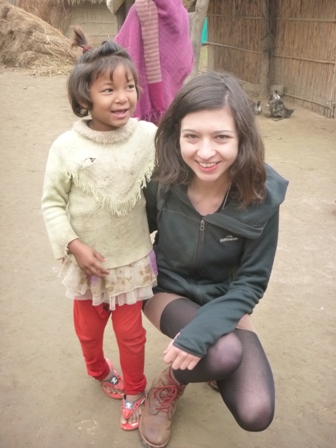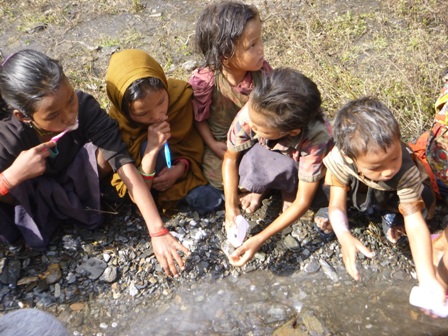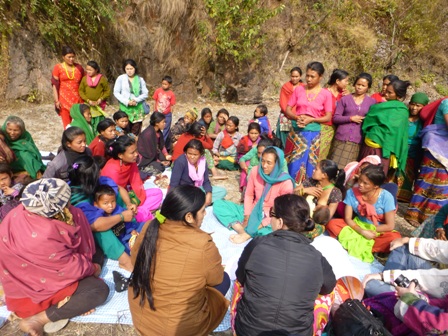my volunteering experience: the need for service provision for women and children in nepal

In January 2014 I went on a volunteer trip to Nepal with an organisation called Student Volunteer Placement’s International (SVPI). SVPI is a relatively new organisation that was founded a few years ago by Neville and Banita, an Australian couple. On a visit to Nepal, the couple met Keshab, the manager of the Children’s Welfare Organsation (CWON) who told them about his organisation and how it works to improve the lifestyle division between Nepal’s rich and poor. After hearing Keshab’s stories, Neville and Banita decided that doing nothing was not an option. They started up SVPI when they came back to Australia, and have since been taking University students over to volunteer.
Now working alongside CWON, SVPI focuses on improving the health of disadvantaged Nepalese women and children. Every day, Keshab organises a bus to transport the volunteers from his hotel in Chitwan, the Monalisa, into one of the villages in the region.
The villages I worked in were very poor. It was very sad to see some of the conditions people were living in. I saw firsthand what it is like to live in poverty. Many of the people in these villages struggle to make ends meet and have no access to healthcare and education. While these services do exist around the nation, they are only available to those who can afford them. The result is that large proportions of poor communities are illiterate and know very little about medicine and how to look after their health. And when access to healthcare and education is this limited, they are not able to improve their position.
In many of the poorer Nepalese villages, infections and contagious diseases like measles and HIV are common. When working in villages I saw many people who were very sick with no money to see a doctor. On top of this they had not learnt the skills to acquire an income and thus had no means of changing their impoverished conditions. It was extremely sad for me to see people living like this, but this also made extremely clear to me how important it is to have access to healthcare and education.

In Nepal, funding for the provision of free health and education would make a huge difference. As very little support for this is provided by the government, organisations like CWON ask for donations from overseas to provide for poor villages. With these donations, CWON works to provide villages with essentials like taps and toilets, and with the help of SVPI, CWON is gradually providing villages with access to healthcare and schooling.
I was able to see firsthand the difference made through donations. While the villages that CWON had not worked in previously had high rates of infectious disease and very little economic means, a village called Padampur, which has received a lot of help from CWON, was in a wholly different position. Over the past seven years, CWON has improved Padampur’s access to schools, running water and sewerage systems. The organisation has provided toilets and taps to the village and has built a large school right next to the main area of residence. As a result, Padampur has flourished. Most children attend school and there is only a small amount of chronic illness. By observing the difference between Padampur and other villages, I was able to see that even a small amount of government funding for service provision could make a huge difference.
On many days of the trip my volunteer group travelled to Chitwan villages and worked with CWON to provide first aid services and run health promotion activities. In my volunteer group there were a few volunteers studying medicine and nursing. While these individuals used their skills to provide medical services, the rest of us spent our time running education sessions that emphasised the importance of good hygiene and health. These sessions focused on local women and children, who were split into two groups. While some of the volunteers involved children in habitual activities, such as hand washing and teeth brushing, others would run an information forum with the women. The forums were extremely informative and led to the women’s groups being my favourite activity.
We worked with a translator to teach the women about the reproductive system, and how to look after the body. Afterwards we would give them a chance to talk to us about concerns they had about their health. We would not allow men into the group and we always promised confidentiality, thus allowing them to talk to us about private conditions such as STIs and prolapses, which is culturally taboo. Although the sufferings of women were difficult to listen to, they provided us with insights into why such severe conditions exist. While STIs and prolapses are rare in Australia, the poor hygiene of many Nepalese women combined with their inability to access professional health services puts them at high risk.
For me, this insight was the reason the women’s groups were my favourite part of the volunteering program. The groups taught me about the health experiences of Nepalese women and I learnt that lack of government funding for public services underpins many Nepalese health issues. When a nation’s government provides funding for fundamental infrastructures and public services, communities are healthier and people live longer. Unfortunately in Nepal there is very little funding for these services.
While organisations like CWON have stepped in to fill the need, the reality is they cannot do everything. Ideally, CWON needs help from the Nepali government. With enough government funding, the organisation could grow bigger and provide resources and services to more of the many villages with low accessibility. This is a big ask and requires significant political change, but it is a request that SVPI and CWON are working on. It may be some time before the organisations get government support. Regardless, they will continue with their work.

If you’re interested in learning more about either organisation, donating to CWON, or even volunteering on one of SVPI’s trips, check out svpi.org.au or contact the program coordinator, Calida Neal, at [email protected].


Heidi,
The work you did in Nepal was so meaningful and very inspiring. Have you been back since? I also know first hand what some of the living conditions there can be like, and although they are slowly getting better, I agree with you that it is up to the government to ultimately help their own people. What villages did you work in? I’ve worked in some outside of Kathmandu. Great article and thanks for sharing!